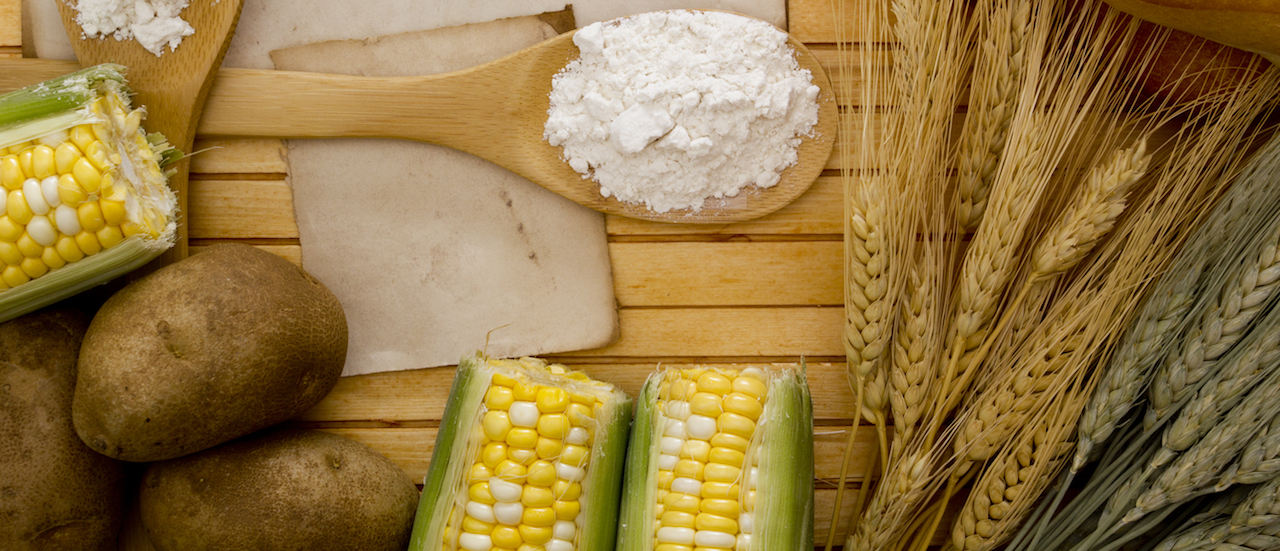Starch is a carbohydrate, and carbohydrates are your body’s main source of energy. When you eat carbohydrates, your body breaks them down into glucose. Think of glucose as the petrol, the fuel of your brain. It’s used by your body to drive and energise your cells, tissues and organs.
“Although your body can derive energy from both fats and protein, the metabolic processes are more taxing, so wherever possible, your body will choose glucose as its first source of fuel,” explains Lee-Anne McHarry, a consultant dietician from Cape Town.
Now of course, we all know that in recent years, carbs have become bad guys. Carbohydrates often get a wicked reputation for causing weight gain, and because starch is a type of carbohydrate, we think starchy foods are fattening.
But not all carbs are created equal. And, carbs don’t make you fat per se.
Starch is a complex carbohydrate. Complex carbs are digested slowly and offer longer-lasting energy between meals. They’re often high in fibre, which can help stabilise your blood sugar levels, curb cravings, and keep you satiated.
But like carbohydrates, some starches are better for your health than others.
Wholegrain, high-fibre foods are best, says McHarry. These include wholewheat bread, oats, legumes, brown rice, and vegetables like corn, butternut and sweet potatoes. These foods take longer for your body to digest and break down into glucose
They’re also a good source of essential vitamins and minerals, and resistant starch. Like fibre, resistant starch isn’t digested in your small intestine and causes little or no rise in blood sugar. According to recent findings in Nutrition Bulletin, resistant starch can improve the feeling of being full and satisfied, prevent weight gain, and help you lose weight.
That’s not to say you should go crazy for starches. Starches to avoid include refined foods like white bread, rice and pasta. When these foods are processed, their starchy part is removed. This also removes some of its nutritional and fibre content. As a result, these foods are digested very quickly and can cause a spike in blood sugar. A diet high in refined grains has been linked to obesity, Type 2 diabetes, and heart disease.
Do we actually need starch?
Yes. When chosen correctly and eaten in reasonable portions, starch can form part of a healthy, balanced diet. It’s an excellent source of energy, fibre and nutrients, including calcium, iron and B vitamins. According to the National Health Service, about half of your daily calorie intake should come from starchy foods.
Choose the right starch
- Go for fresh, whole foods and carbs in their most natural form.
- When shopping for starchy foods look at the ingredient list and make sure the first ingredient is wholewheat flour, brown rice, rye flour, barley or oats.
- Look for “100% wholegrain” or “100% wholewheat” on food labels.
- Opt for starchy foods with a low-glycaemic index (GI). Low GI foods are slowly digested and cause a steady rise in your blood glucose.
References:
- http://www.livestrong.com/article/313624-list-of-starchy-foods-to-avoid/
- http://www.livestrong.com/article/495891-why-is-starch-good-for-the-body/
- http://www.nhs.uk/Livewell/Goodfood/Pages/starchy-foods.aspx
- http://www.independent.co.uk/life-style/health-and-families/health-news/carbohydrates-bad-do-not-gain-weight-fat-research-a7207666.html
- http://edition.cnn.com/2009/HEALTH/expert.q.a/04/17/potatoes.starch.glycemic.index.jampolis/index.html
- http://onlinelibrary.wiley.com/doi/10.1111/nbu.12244/full
- https://www.verywell.com/what-you-need-to-know-about-complex-carbohydrates-2242228

